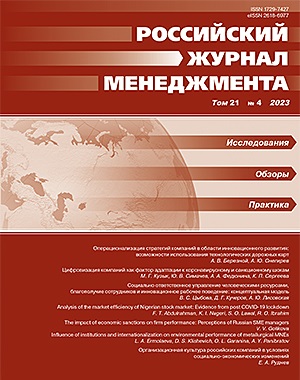Анализ эффективности фондового рынка Нигерии после завершения локдауна COVID-19
DOI:
https://doi.org/10.21638/spbu18.2023.404Аннотация
Цель исследования: оценка эффективности фондового рынка Нигерии после отмены локдауна, введенного из-за пандемии COVID-19, оказавшей существенное влияние на африканские страны, в том числе на их фондовые рынки.
Методология исследования: эмпирическое исследование проведено при помощи моделей GARCH. Авторы выдвинули три предположения о распределении ошибок в модели. Были использованы данные, охватывающие период с июня 2020 г. по декабрь 2022 г.
Результаты исследования: установлено, что в период после пандемии COVID-19 фондовый рынок Нигерии демонстрирует слабую форму неэффективности, но при этом эффективен в умеренной форме.
Оригинальность и вклад авторов: работа представляет собой первое полноценное эмпирическое исследование эффективности фондового рынка Нигерии после пандемии COVID-19. Авторы акцентируют внимание на том, что разные уровни эффективности рынка определяются независимо друг от друга. Так, эффективность в умеренной (semi-strong) форме может быть достигнута без эффективности в слабой форме. В исследовании подчеркивается важность внедрения строгого надзора, правил и регулятивных мер, способных ограничивать участие трейдеров и инвесторов в коротких продажах с целью получения прибыли, особенно в отношении акций, которыми владеют институциональные инвесторы.
Ключевые слова:
Нигерия, эффективность рынка, фондовый рынок, COVID-19, модель GARCH
Скачивания
Библиографические ссылки
References
Загрузки
Опубликован
Как цитировать
Выпуск
Раздел
Лицензия
Статьи журнала «Российский журнал менеджмента» находятся в открытом доступе и распространяются в соответствии с условиями Лицензионного Договора с Санкт-Петербургским государственным университетом, который бесплатно предоставляет авторам неограниченное распространение и самостоятельное архивирование.





